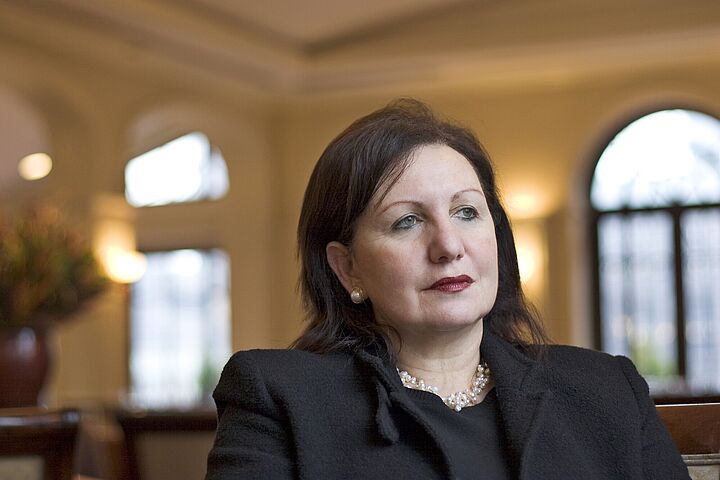Donnerstag, 05. Oktober 2023, 18:30 - 20:00 iCal
Seyla Benhabib - IWM Lectures in Human Sciences
The Changing Fortunes of Cosmpolitanism: Demos, Cosmos and Globus
Lecture I: Kantian Cosmopolitanism and its Critics
Großer Festsaal im Hauptgebäude der Universität Wien
Universitätsring 1, 1010 Wien
Hybrider Event (an einem physischen Ort und online)
The intense interest in cosmopolitanism in the social and political sciences, cultural and legal studies dates back to the last two decades of the twentieth century. With the fall of the Berlin Wall in 1989, the reunification of Germany, and the extension of the European Union to east and central European countries formerly under Communist rule, the Kantian cosmopolitan ideal of uniting diverse countries under the rule of law, respect for human rights and the free exchange of goods and services seemed to come alive. By the beginning of the new century, cosmopolitanism had fallen on hard times. This lecture series will defend cosmopolitanism from below by engaging with the postcolonial critiques of Kantian thought, voiced by James Tully, Inez Valdez, Sylvia Wynter and Walter Mignolo.
Cosmopolitanism is a contested legacy: whether one describes Socrates as the first cosmopolitan––kosmopolitēs (“citizen of the world”)––or reserves the term for the cynic, Diogenes Laertius, Marcus Tullius Cicero or Marcus Aurelius, the Roman Emperor, (Appiah 2006) cosmopolitanism begins with a critique of the polis and the civitas in the name of the cosmos, of an ordered reality whose rationality transcends the many and conflicting, and often unjust, nomoi (laws and customs) of the political world. By interpreting cosmopolitanism as “world citizenship,” Kant makes a fundamental contribution to this tradition. By focusing on Kant’s essay on “Perpetual Peace,” Seyla Benhabib defends aspects of Kant’s legacy against liberal nationalisms as well as postmodern and de-colonial criticisms.
Seyla Benhabib is the Eugene Meyer Professor of Political Science and Philosophy Emerita at Yale University. She is currently Scholar in Residence at Columbia Law School and Professor Adjunct of Law, where she teaches legal and political theory as well as a course on refugee, migration and citizenship law in comparative perspective. She also holds appointments in Columbia University’s Center for Contemporary Critical Thought and the Department of Philosophy. Professor Benhabib is the author of numerous publications, including: Exile, Statelessness, and Migration. Playing Chess with History from Hannah Arendt to Isaiah Berlin (2018), Another Cosmopolitanism (2006), The Claims of Culture (2003), and The Rights of Others (2004). She is currently working on a book called At the Margins of the Modern State. Critical Theory and the Law (Forthcoming with Polity Press). Her work has been translated into twelve languages. Professor Benhabib has previously taught at the New School for Social Research and Harvard Universities, where she was Director of Harvard University’s Program for Degrees in Social Studies. Throughout her professorial career, she has held many prestigious visiting professorships including the Spinoza Chair in Amsterdam (2001), the Gauss Lectures at Princeton (1998), the John Seeley Memorial Lectures (Cambridge University, 2002), and the Tanner Lectures (Berkeley, 2004). Professor Benhabib is the recipient of the Ernst Bloch prize (2009), the Leopold Lucas Prize (2012), and the Meister Eckhart Prize (2014). Currently, Seyla Benhabib is Albert Hirschman Fellow at the Institute for Human Sciences (Insititut für die Wissenschaften vom Menschen, IWM) in Vienna.
George Karamanolis, Associate Professor of Ancient Philosophy and Head of the Department of Philosophy at the University of Vienna, will open the lecture series and give the welcome address.
Zur Webseite der Veranstaltung
Veranstalter
Um Anmeldung wird gebeten
Kontakt
Kasper Nowak, MA
Institut für die Wissenschaften vom Menschen
31358108
eventmanagement@iwm.at
Erstellt am Freitag, 29. September 2023, 11:55
Letzte Änderung am Montag, 09. Oktober 2023, 08:20

